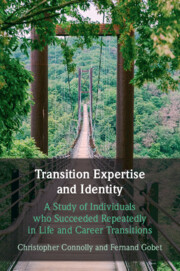 Transition Expertise and Identity
Transition Expertise and Identity Book contents
- Transition Expertise and Identity
- Transition Expertise and Identity
- Copyright page
- Dedication
- Contents
- Figures
- Tables
- Preface
- Acknowledgments
- Chapter 1 Introduction
- Part I Transitions
- Part II Transition Expertise
- Part III Motivation
- Part IV The Project of the Self
- Chapter 11 Identity
- Chapter 12 Self Concept
- Chapter 13 Conclusion
- Appendix 1 Methodology
- Appendix 2 Nontransitions
- References
- Index
Chapter 12 - Self Concept
Its Evolution during Career Stage Transitions
from Part IV - The Project of the Self
Published online by Cambridge University Press: 30 May 2024
- Transition Expertise and Identity
- Transition Expertise and Identity
- Copyright page
- Dedication
- Contents
- Figures
- Tables
- Preface
- Acknowledgments
- Chapter 1 Introduction
- Part I Transitions
- Part II Transition Expertise
- Part III Motivation
- Part IV The Project of the Self
- Chapter 11 Identity
- Chapter 12 Self Concept
- Chapter 13 Conclusion
- Appendix 1 Methodology
- Appendix 2 Nontransitions
- References
- Index
Summary
Self concept is an evolving sense of self that encompasses work, expression of potential, and purpose for being. Self concept is more encompassing than identity, and includes motivations, beliefs such as self-efficacy, attributions and construals, mental models of self, and social roles. Self concept grows and evolves through life and transitions, but only seldom does the whole self concept come up for review and revision. Narrative construction provided an approach to examining how the stories individuals tell about themselves shape and help create their evolving self concept. The evolution of self concept is reviewed in light of the operation of the transition experiences – cognitive flexibility, generative intelligence, personal intelligences, motivation, and purpose through the use of retrospective interviews with twenty-four elite performers in three domains (business, sports, and music) who successfully and repeatedly transitioned to higher positions within their field.
Keywords
- Type
- Chapter
- Information
- Transition Expertise and IdentityA Study of Individuals Who Succeeded Repeatedly in Life and Career Transitions, pp. 267 - 319Publisher: Cambridge University PressPrint publication year: 2024
